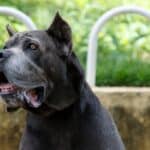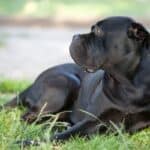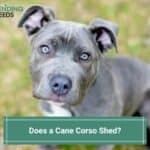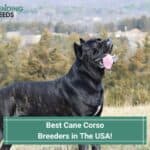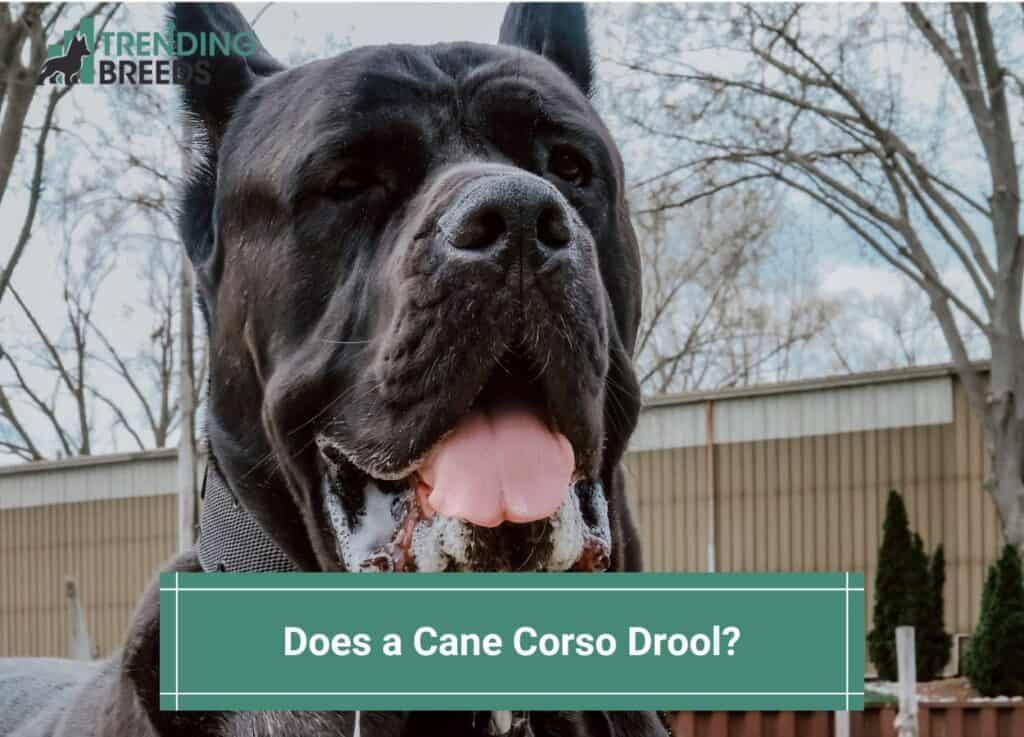
Drooling is part of life as a dog owner. After all, saliva plays a central role in canine digestion because it contains enzymes that support the digestion process.
Plus, it acts as a lubricant, helps your dog swallow food, and even has antibacterial properties. Researchers have found that dog saliva contains proteins that can prevent some infections by breaking down bacteria.
But does Cane Corso drool? Like many Mastiff breeds, the Cane Corso tends to drool more than other dogs. As a Cane Corso owner, you should know what to expect regarding drooling and when excessive salivation can signal an issue.
Other articles you would like: Are Cane Corsos Naturally Protective? and Cane Corso Great Dane Mix
Table of Contents
Does Cane Corso Drool?
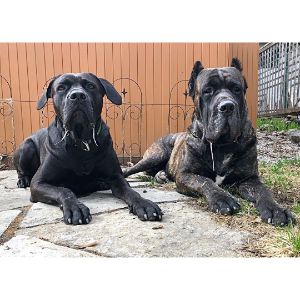
All dogs drool but some breeds, like the Cane Corso, slobber more than others due to the shape of their lips.
Cane Corsos and other Mastiff breeds have long flews or upper lips that cover the teeth and part of the lower jaw. They also have large jowls or lower lips that sometimes droop.
These droopy lips can cause saliva to drip, resulting in slobber. While all dogs drool, lips that result in slobber can make Cane Corso drooling more noticeable.
How much do Cane Corso drool? It’s common for the breed to have wet fur around the mouth area. Many Mastiff owners get into the habit of using cloths or small towels to wipe the excess saliva and manage drooling.
Since dog saliva can contain bacteria and parasites, make sure you wash these towels often.
What Causes Drooling in Cane Corso?
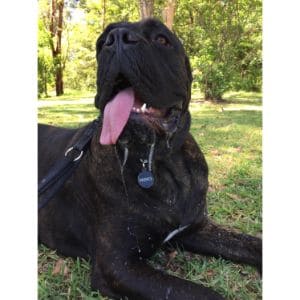
Why do Cane Corso drool? Drooling can vary based on the individual and circumstances, but some factors can contribute to excessive salivation.
Genetics
Like many other traits, genetics can affect salivation. Some individuals have more active saliva glands.
If you’re considering getting a Cane Corso puppy, ask the breeder a few questions about the parents and find out how much they usually drool. Physical traits like the size of the flews and jowls can make the breed slobber more than other dogs.
Stress
Some dogs produce more saliva when they feel anxious. You might notice that your pet is also panting, yawning, or licking themselves more than usual.
If your dog tends to slobber on furniture when you’re away, separation anxiety could be to blame. When stress causes drooling, saliva production should return to normal once your pet relaxes.
Salivating
Have you ever felt your mouth watering after smelling food? The same thing happens with dogs! Their saliva glands become active when they anticipate eating. Some dogs will even start salivating even though there are no food smells because of conditioning.
So, when considering the question, “does Cane Corso drool?” expect some slobbering while you prepare dinner, especially if you’re cooking meat!
Sleeping and Dreaming
Do Cane Corsos drool in their sleep? The answer is yes. During sleep, a Cane Corso’s facial muscles will relax, and their mouth might open slightly. Saliva can come out and start pooling.
In fact, it’s not unusual for pet owners to find a small puddle of drool in their dog’s bed or on the couch.
While it does have messy results, drooling is normal when sleeping. For instance, dogs go through sleep cycles that include rapid eye movement.
Dreaming can occur during these cycles, and it’s far too easy for them to start salivating if their imagination turns to food.
Still, if drooling is an issue, keep your dog off the furniture or create a designated space where they can nap on a blanket that will absorb saliva.
Drinking Water
Due to their large flews and jowls, Cane Corsos can make quite a mess when they drink.
If your Cane Corso is leaving water and saliva in their wake, the simple solution is to place a mat underneath your dog’s water bowl to absorb some of the mess.
Teething
Puppies typically get their first set of baby teeth between two and four weeks of age. Unsurprisingly, you can expect some drooling and discomfort during this process.
Your Cane Corso will lose these deciduous teeth when they start to get their adult teeth at around six months.
As with human babies, this process can cause discomfort and increase saliva production. You can help your pet by offering chew and teething toys.
Medications
Some medication can lead your dog to drool more than usual, especially if it’s a treatment you have to administer orally. Even painkillers have the potential to bring about saliva buildup.
Allergies
Experts believe that as many as 10% of dogs have allergies to things like grass, pollen, mold, medication, and even food.
Drooling can occur when your pup’s system attempts to flush the allergen. Common allergy symptoms include itching, coughing, sneezing, or watery eyes and nose.
When Is Drooling an Issue?
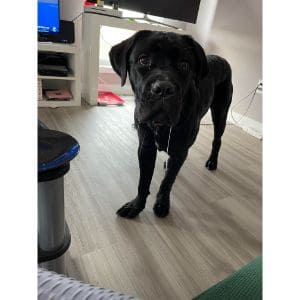
As a Cane Corso owner, you need to recognize when drooling is excessive and indicates an issue. Some drooling is natural with this breed, but sudden changes in the amount of slobbering you notice can indicate a health problem.
It’s best to schedule a checkup at the vet if you notice changes in drooling alongside other symptoms.
Several conditions can trigger excessive drooling. You can manage the excess saliva by using a cloth or towel to wipe it until you figure out the root of the issue.
Dental Issues
Dental problems often result in excessive drooling, especially in older dogs. For instance, dental disease can cause plaque to build up in your dog’s mouth. In some cases, the excess tartar can create pressure on the gums and cheeks and make it difficult for your pet to close their mouth.
Other symptoms of dental disease will typically include bad breath and yellow or even brown teeth. You might also be able to see tartar deposits along the gumline.
Usually, dental disease won’t be an issue in healthy and young dogs, but it affects 80% of dogs over the age of three and tends to get worse in older pooches.
You can manage most dental health issues with an oral hygiene routine that includes brushing or cleaning your dog’s teeth with a dental wipe daily.
In addition, consider scheduling regular teeth cleaning so your vet can scrape off tartar buildups.
Besides dental disease, your pup might be experiencing excessive drooling due to a mouth injury, foreign object, broken tooth, blocked saliva gland, or mouth tumor. If your dog is slobbering more than usual, look in their mouth to check for anything unusual.
You can prevent mouth injuries and broken teeth by offering safe chew toys. Bones, hooves, and some nylon chew toys are too hard and can damage teeth, even though the Cane Corso has a strong bite.
As a rule of thumb, if you can’t create an indentation with your fingernail on a chew toy, it’s not safe for your pet’s teeth.
Nausea
If your dog is nauseous, their salivary glands will typically become more active. It’s a natural response that allows saliva to form a coating that will protect the mouth from stomach acids.
A wide range of factors can lead to nausea. One of the most common causes is dietary indiscretion. If your dog recently ate some unhealthy table scraps or got into the garbage, you can expect some vomiting.
However, vomiting can alternatively stem from pancreatitis, an obstruction in the digestive system, a viral infection, or another serious health condition.
To help with nausea, you could withhold food for a while and offer a bland diet should help with nausea. If your dog keeps vomiting, it’s best to schedule a vet appointment so you can get a proper diagnosis.
Besides vomiting and drooling, you should watch out for other symptoms like lethargy or fever.
Motion sickness is another frequent contributor to nausea and an uptick in drooling. If your Cane Corso seems to slobber more than usual during car rides, they’re likely feeling a little carsick.
You can help by limiting food and treats before car rides or using an over-the-counter remedy.
Liver and Kidney Disease
Unfortunately, drooling can indicate a more severe condition like liver or kidney disease. These conditions affect the liver or kidneys’ ability to filter the toxins in your dog’s system.
As a result, the body will eliminate these toxins through saliva. The result is often excessive drooling, bad breath, and mouth ulcers.
While liver and kidney disease are serious conditions, drooling itself isn’t a cause for concern since there are many other benign reasons for it.
Liver and kidney disease will come with other symptoms, such as lethargy, vomiting, a loss of appetite, weight loss, pale gums, yellow eyes, and dark-colored urine.
A vet will be able to make a diagnosis with bloodwork and other tests. If you’re noticing excessive drooling and more troubling symptoms, it’s best to schedule an appointment.
Nerve or Brain Damage
An injury or illness that affects your pet’s cranial nerves can result in partial paralysis in the face or make it difficult to control the muscles around the mouth. The mouth might stay open and excessive drooling will occur.
Nerve damage can result from an injury, but it can also be a complication of untreated liver disease since this condition will eventually affect the brain.
Thankfully, nerve damage and paralysis aren’t common conditions. You should notice partial paralysis along with excessive drooling.
Poisoning
Another source of excessive drooling is toxins. When your pet ingests harmful poisons, their body will attempt to flush them out through saliva.
If your Cane Corso is producing excessive saliva, foaming at the mouth, and displaying other symptoms, you’ll need to act fast.
You should take your dog to an emergency vet or contact the Animal Poison Control Center (ASPCA) for assistance.
Poisoning can occur if your dog eats toxic foods like chocolate, grapes, coffee, or candy containing the artificial sweetener Xylitol. Toxic plants, rodenticides, and antifreeze can also cause poisoning.
Excessive drooling alone doesn’t indicate poisoning. Your dog will have other worrying symptoms such as disorientation, vomiting, diarrhea, shaking, convulsions, or seizures.
Does Cane Corso Drool?
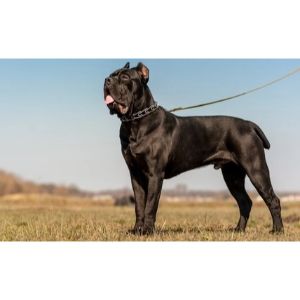
So, does Cane Corso drool? The answer is yes. Some amount of drooling is normal in all dogs, and the Cane Corso tends to slobber more than other breeds due to the size of their flews and jowls.
Other factors can ramp up your pet’s drooling, including motion sickness, smelling food, and dental disease.
You can manage the drool by wiping it from your dog’s face with a cloth and changing your pet’s blankets frequently. It’s important to learn to recognize how much drooling is normal for your pet so you’ll know right away if something changes.
You will also like:
For more information about Cane Corso Drooling, check out the video below:

